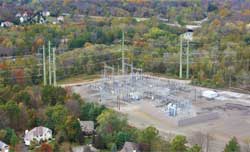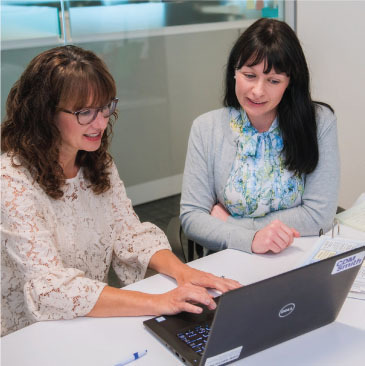May/June 2018
Communities: Private Practice
Michigan PEs Seek to Lead Firm Into Energy Future
 Commonwealth Associates Inc.’s historical legacy began in the late 1880s, when the brothers W.A. and J.B. Foote experimented with arc light generators and high voltage transmission. One of their first big projects involved the Trowbridge Dam, which featured a 1.5 MW generator and 22 kV transmission line to transport power into the town of Kalamazoo, Michigan.
Commonwealth Associates Inc.’s historical legacy began in the late 1880s, when the brothers W.A. and J.B. Foote experimented with arc light generators and high voltage transmission. One of their first big projects involved the Trowbridge Dam, which featured a 1.5 MW generator and 22 kV transmission line to transport power into the town of Kalamazoo, Michigan.
Since then, the brothers’ work has evolved into an Engineering News-Record Top 500 design firm led by NSPE member Richard Collins, P.E., who was named CEO in 2017. Collins is helping to lead the Jackson-headquartered, employee-owned engineering design and power generation consulting firm to the next level. Commonwealth also serves utilities, independent power producers, government and industrial clients, and higher education institutions from offices in Atlanta; Seattle; Spokane, Washington; Columbus, Ohio; and Lancaster, Pennsylvania.
PE spoke with Collins and Ian Hutt, P.E., an electrical engineering project manager, about the firm’s growth strategies and boosting its reputation in the renewable energies market.
Grassroots Growth
While the trend for AEC firm growth relies on mergers and acquisitions, Commonwealth prefers a grassroots strategy for opening new offices in key locations. For example, the firm opened an Atlanta office because it needed a presence in the southeast to service large clients; and its largest client in Columbus, Ohio, warranted an office in that city. This strategy helps Commonwealth maintain the company’s culture and values in each office, says Collins. “We’ve seen large firms buy mom-and-pop firms just for the engineering talent, and there wasn’t a good fit. They probably lasted a year and a half before closing.”
As Commonwealth continues expanding across the country, keeping its offices “connected” is a top goal for the firm’s leadership team. Once a month, Collins issues a video blog to address a pertinent topic and to help improve engagement between the management team and staffers. Plus, quarterly townhall meetings are broadcast from headquarters.
Another part of the strategy to keep its offices connected is the development of a new headquarters building in downtown Jackson. The building will bring together all local employees, who are currently located in three different buildings.
Collins is leading the firm with a philosophy focused on building leaders at every level of the company, regardless of title. “We want leaders who provide innovative solutions to meet our client’s emerging challenges while providing thought leadership for the industry,” he says.
The firm supports the buildup of staff leadership competencies through training with Dale Carnegie, the Ross School of Business at the University of Michigan, and Lead Star.
An engineer surely won’t get through the door without having high-level technical skills, so what’s the differentiator for Commonwealth leaders? Emotional intelligence is taking on a higher priority in promotion decisions. One of the firm’s past mistakes when grooming leadership, says Collins, was bringing an engineer into management based simply on their technical skills and seniority. “Having the emotional intelligence to communicate with and lead your staff carries a lot of weight,” says Collins. “When you get the wrong person in that role, you create a retention problem.”
Shaping the Energy Future
 The bulk of Commonwealth’s work involves projects on the traditional energy grid. That work isn’t going away, but there has been a move to expand into work driven by climate change and sustainable energy generation, which involves distributive energy resources, microgrids, and energy storage.
The bulk of Commonwealth’s work involves projects on the traditional energy grid. That work isn’t going away, but there has been a move to expand into work driven by climate change and sustainable energy generation, which involves distributive energy resources, microgrids, and energy storage.
Ian Hutt’s work group focuses on protection and systems studies, including interconnection studies, for clients. Rather than just concentrating on the nuts and bolts of building a substation, he says, the group takes a “systems approach” to see how all the substations interact and to make their clients’ systems more reliable and robust.
Commonwealth also wants to be at the forefront of connecting renewables to the power grid. Hutt explains that there may be some utilities or independent developers of windfarms or solar stations that don’t have the expertise to fully connect to the grid and into homes, but they know how to purchase the land or purchase equipment and install it. “Maybe they have a good site, but it’s not a good place to connect to the grid or the grid is overloaded and they must put a lot of upgrades into the system to accommodate it,” says Hutt. “Through our interconnection studies, we can recommend places that represent sweet spots.”
As a reflection of its commitment to a more “secure energy future,” Commonwealth, in partnership with Doosan GrudTech, is involved in its first battery-storage project with the public utility Consumers Energy. Commonwealth will be providing multidiscipline installation design and ground grid analysis services for the storage system at the Colony Farm substation in Kalamazoo, Michigan. The system will have a capacity of one megawatt.
Battery storage is a new technology, but Collins isn’t waiting to see how the market develops. He wants Commonwealth to be one of the early players in this arena. “Utilities are looking to purchase these large batteries and put them in a substation or some area, so when the wind blows at night it will store the energy and then you can release it as you need it,” says Collins. “With our knowledge of substations and how the grid operates, we are poised to help utilities and manufacturers to find the best place for energy storage.”


 Volunteering at NSPE is a great opportunity to grow your professional network and connect with other leaders in the field.
Volunteering at NSPE is a great opportunity to grow your professional network and connect with other leaders in the field. The National Society of Professional Engineers (NSPE) encourages you to explore the resources to cast your vote on election day:
The National Society of Professional Engineers (NSPE) encourages you to explore the resources to cast your vote on election day:






